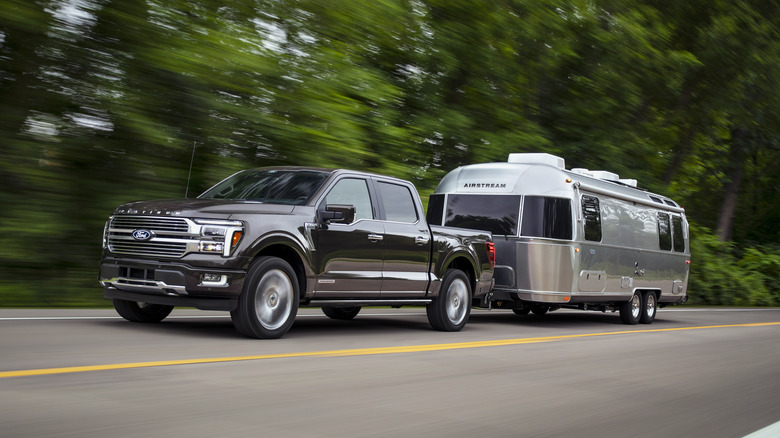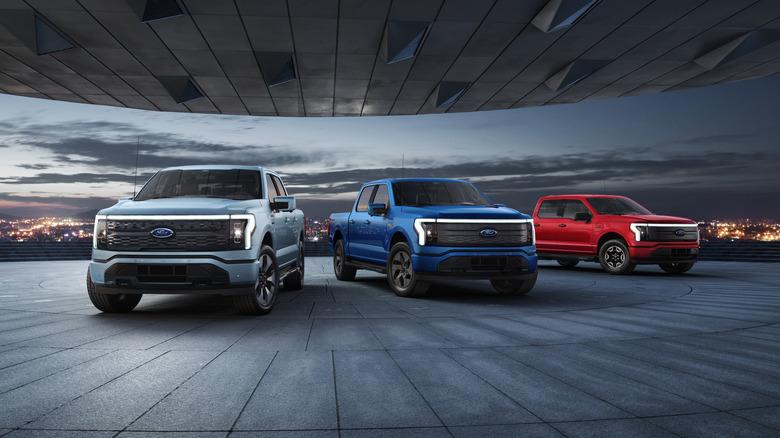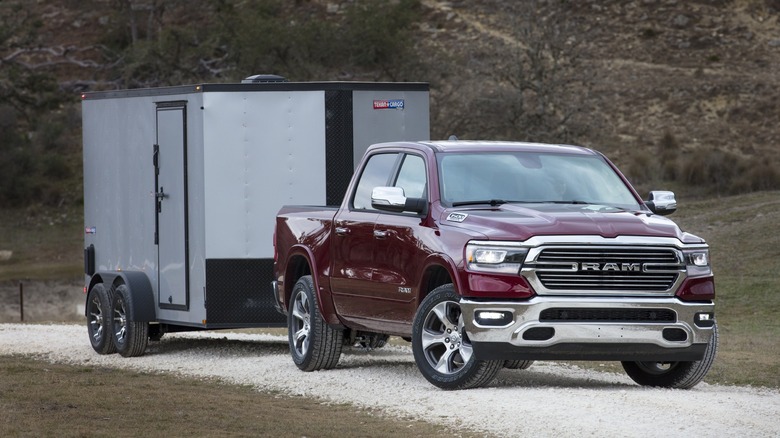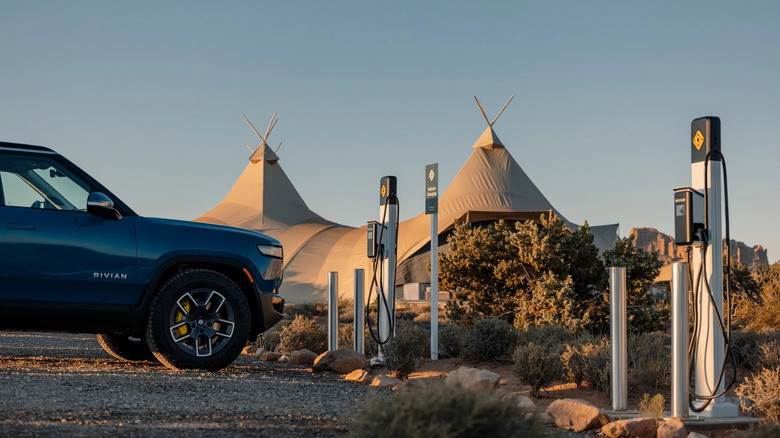Why Your Next Truck Should Be Gas-Powered, Not Electric
Although the concept isn't new by any stretch of the imagination, electric pickup trucks are a fairly new segment of the market in reality. Several automakers have promised to make an electric truck recently, and even fewer have actually delivered on the promise. As of early June 2024, the only EV trucks you can theoretically go out and buy are the Ford F-150 Lightning, Rivian R1T, and (love it or hate it) the Tesla Cybertruck. GM's EV Silverado and Sierra trucks have not yet come to dealer lots, and the electric RAM truck on the horizon still has a year or two before you'll start seeing them. The GMC Hummer EV, while technically a pickup truck in that it has a bed present in some forms, is not advertised as a useful work vehicle.
You really don't have a lot of options if you have your heart set on buying an EV truck right now. However, both the Rivian R1T and F-150 Lightning have been fairly well received since hitting the charging ports. Do those trucks signal the upcoming death of pickup trucks. If you're of the demographic that uses pickup every day, your current truck likely isn't electric, but should the next one run on electrons instead of gasoline? Not exactly.
The electric truck market is (very slowly) growing, but the segment is nowhere near where it should be if it wants to become the next generation of trucks.
Some benefits to an EV
Electric trucks offer a lot in comparison to a regular gasoline car. You can't beat the instant acceleration and torque offered by electric drivetrains, and the engine-less nature of EVs offer some creative storage solutions. The F-150 Lightning offers a huge frunk for storage, and Rivian has some hidden features every car should have. However, with all the cool party tricks, EV trucks still aren't there when it comes to actual capability compared to gas-powered trucks.
Quick acceleration and torque aren't unique to EV trucks, it's just the inherent nature of EVs, and straight line speed isn't really a useful feature in trucks anyway (despite what Tesla would have you believe). As of now, EV trucks pale in comparison to gas trucks in ways that trucks actually matter, such as towing ability, payload capacity, and overall convenience. EV pickups are the cutting edge of the market, and there will likely be a time in the future where such vehicles are the norm, but it's not yet.
EV truck specs
It's time to break down the specifications of EV trucks and compare the numbers to gas-powered counterparts. Rivian lists the R1T as having a payload (the maximum amount of weight it can carry inside the vehicle) as 1,764 pounds and having a maximum towing weight of 11,000 pounds. The Ford F-150 Lightning isn't really as cut and dry, given that it has more variations than the Rivian, but its maximum payload with a standard range battery is 2,235 pounds. The extended range battery takes that down to 1,952 pounds. The maximum towing capacity for a Lightning XLT or Lariat with the "Max Trailer Tow Package" and extended range battery is 10,000 pounds.
Finally, Tesla has touted a lot of features of its CyberTruck. However, given that most people aren't getting shot at with any amount of regularity, or entering an avant-garde art show, the technical specifications are the only necessary numbers at the moment. The stainless steel wonder has a maximum towing weight of 11,000 pounds, and maximum payload of 2,500 pounds, according to Tesla.
Payload and towing comparison
Those numbers all seem great on the outset, and as odd as it is, the CyberTruck technically wins out on specs alone. However, how do those specifications stack up against gas-powered trucks? As it's one of the most popular vehicles in the history of motorized transport and by far the most popular truck, the gas-powered Ford F-150 is the perfect vehicle for comparison. As far as payload is concerned, the F-150 tops out at 2,445 pounds for models equipped with a 3.5-liter EcoBoost V6, only 55 pounds less than the CyberTruck, 210 pounds more than the Lightning, and 681 pounds more than the Rivian. While the payload capacity is lower than the CyberTruck, the Tesla's wacky bed shape precludes it from a lot of normal truck work. A gas-powered F-150's bed is much more usefully-shaped, and it can carry more than most of its EV counterparts.
For towing capacity, the 3.5-liter EcoBoost-powered F-150 wins again, topping out at 13,500 pounds. EV trucks don't fare much better against the internal-combustion Chevy Silverado's maximum towing capacity of 13,300 pounds, or the hybrid Ram 1500's 12,750 pound maximum towing capacity. To further illustrate the divide between EV trucks and internal combustion trucks, a diesel-powered F-450 tops out at a 40,000 pound towing capacity, although to be fair to the EVs, very few people are likely cross shopping between a Rivian and a Ford F-450. It's also worth mentioning that towing anything with an EV cuts the estimated range by a significant portion.
Convenience issues
For regular commuting and running errands, EVs can be incredibly convenient. If you live in an area with a robust public charging presence (not everyone is that lucky), then you can just charge your car while you're at the grocery store. Better yet, if you have a garage or home charger, you can just charge at the end of the work day. However, if you rely on your truck and its inherent truck-ness for work, the EV drivetrain might lead to more problems than solutions.
If you are just traveling short distances over the course of a work day, then battery range likely won't be an issue. But if you're driving hundreds of miles a day from job to job as an electrician, plumber, or other tradesperson, then an EV truck's 250-300 mile range (a little over 400 miles in Rivian's case) will get annoying very quickly. Filling up at the gas station takes five to 10 minutes. Recharging at even the fastest DC chargers (if you can find one) will have you twiddling your thumbs at a charger for 30-40 minutes. That kind of delay simply won't work for many people in the trades.
The technology isn't there yet
EV trucks are cool, and automakers shouldn't be dissuaded from further developing the segment. There's even a possibility that your specific use case scenario lends itself to an electric car. The switch to EVs should be encouraged. However, the industry is still at least a few years away from a one-size-fits all EV pickup. Will that be around in the future? Maybe, but automakers need to stop touting meaningless 0-60 mph times and gimmicky features and start developing trucks with longer ranges, lower prices, better towing capacity, and shorter charging times. Customers who just want something interesting might opt for a Rivian R1T, but customers who need a truck that does actual work in the real world are going to pick a gas-powered model most of the time.
If you're looking for your next pickup, an EV truck might be viable, but internal combustion power is still the way to go if you need to get work done.





